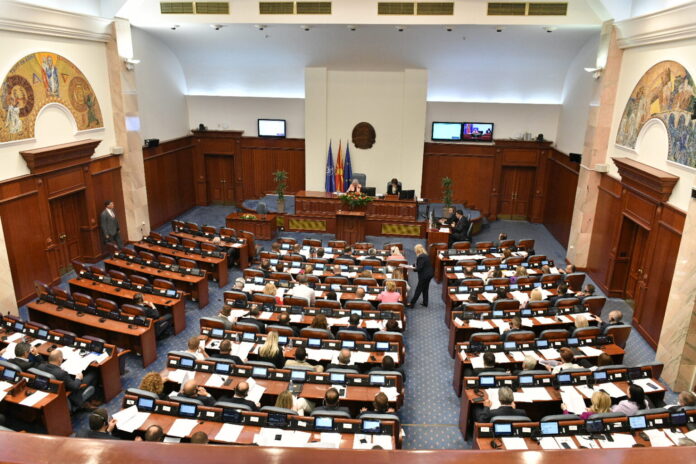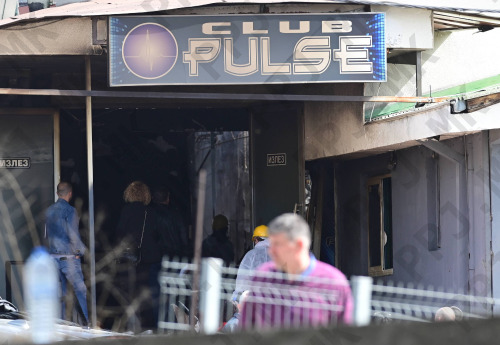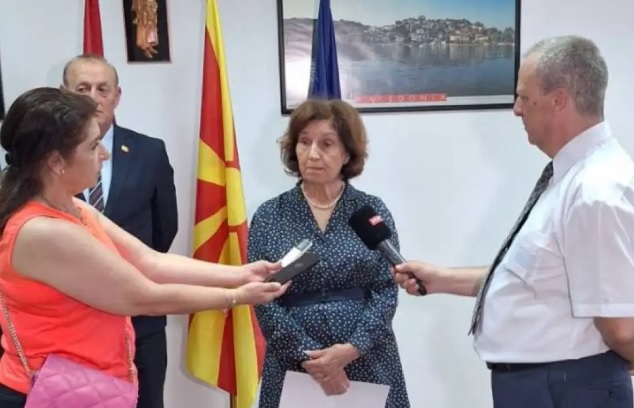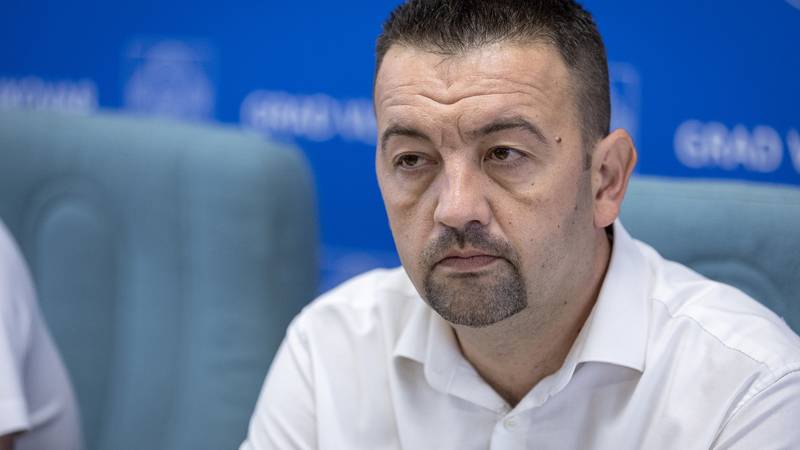Justice is not with emotions, but with facts
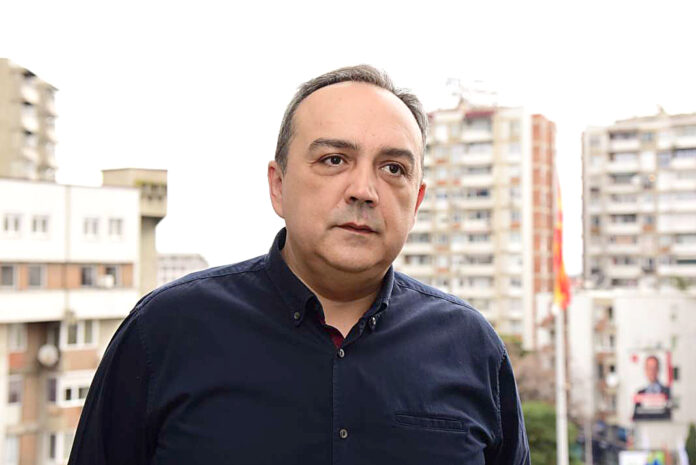
In the case of Dejan Davidovski -Desesho, accused of one of the most serious crimes in modern Macedonian history – terrorism
There should be a difference between emotion and intention, between anger and terror, between presence and guilt. Justice is not revenge. It is precision, it is humanity!
Toni Menkinovski
We are at the heart of a great, difficult and responsible task – to defend the truth, human dignity and the rule of law. Dejan Davidovski – known to the public as Deso – is accused of one of the most serious crimes in modern Macedonian history – terrorism. The indictment set before the court is not usually. It carries weight – the word « terrorism » contains the most severe moral and legal condemnation. But it is our responsibility as lawyers and as citizens and as Macedonians to remember that justice is not dealing with emotions, but with facts. And the facts, respected present, speak something completely different.
Dejan Davidovski is not a terrorist. He is not the organizer of violence, but a man who, like many other citizens, found himself in the sweetheart that day of a deep political and social crisis. What happened on April 27, 2017, in the Assembly was an unhappy, tragic moment for Macedonian democracy. But not everyone who entered that building is a criminal. Not everyone who was there was intending to spread fear and chaos.
The indictment says he was part of an organized group in order to carry out a terrorist attack. We will show that he was not part of any organization, nor did he have access to any weapons, plan, or logistics for such a work. His presence was an emotional, personal response to a political situation, not part of a deliberate, organized act of violence. We will submit evidence, hear witnesses, and point to legal and factual deficiencies in the indictment. We will seek to distinguish between emotion and intention, between anger and terror, between presence and guilt. Justice is not revenge. It is precision, it is humanity. And today, that is exactly what we will ask for Dejan Davidovski – justice based on truth, not on a political narrative.
International practice and lesson from history
The current international practice and lesson in history are necessary to properly consider and understand this case, and to remind how many people have been unjustly accused of terrorism – without sufficient evidence, or as a result of political pressure. So:
– The Brandon Mayfield (USA) case: Oregon’s lawyer wrongly accused of participating in the bombings in Madrid (2004). Released when the prints were proven to have been misdiserved. It was ruled that the state had violated his human rights and was given compensation;
– The Ahmed Zaoui case (New Zealand): Algerian refugee who has suffered allegations of terrorism. After a thorough procedure, he was released and asylum was given after it was established that it was political persecution;
– The Lotfi Raissi case: wrongly accused of training pilots for the 9/11 attacks. The court found no relevant evidence and acquitted him;
– The Ange Diawara case and the 22nd group (Congo): political activists accused of terrorism. Due to pressure from the international public and lack of real evidence, many were released or received political asylum;
– The case of The Birmingham Six: Six Irish convicted of bombings in 1974. After 16 years, the verdicts were abolished due to fabricated evidence and recognitions obtained under torture;
– The case of Alexander (Aco) Todorovski in Canada – Macedonian citizen who received political asylum due to threats and persecution related to his political action in Macedonia. Canadian authorities have acknowledged that there is a real risk of unfair trial and politically motivated charges.
Dejan Davidovski – Desesho is in the same position
These cases clearly show that « the charge of terrorism must be supported by solid and objective evidence », not with political or emotional narratives.
But history continues to remind us that the terms « terrorism » and « national security » have often been abused:
In Spain, Altsasu Case Young Basque activists accused of terrorism after a police fight, eventually convicted of much easier offenses, not terrorism;
In the United States, Post-11 September, cases like that of « Mohamedou Ould Slahi » (« Guantanamo Dnevnik ») show how people were detained for years without charges and released for lack of evidence;
In Turkey, after 2016, thousands of journalists, academics and citizens were accused of terrorism without concrete evidence, as in the case of Osman Kavala (ECTHR: Kavala v. Turkey, 2020).
As the « European Court of Human Rights » tells us, the accusation of terrorism must rest on:
– concrete actions aimed at a serious threat to life or public safety.
– A clear intention to intimidate or disrupt the constitutional order.
– Direct and verifiable evidence.
The standards of the European Court of Human Rights
The European Court of Human Rights in many cases set standards relevant to our case:
– In the case of « Kudrevičius and others v. Lithuania » (2015), the ECtHR noted that even radical forms of political protest, including disturbing public order, must not automatically be treated as terrorism or violent action against the state;
– In the case « Selahattin Demirtaş v. Turkey » (2018), the court found that the arrest of a political leader on terrorism charges, without concrete and strong evidence, was a violation of the right to freedom and political pluralism.
The ECtHR points to the principle that – « not every form of protest, not even if it results in incidents, can be considered an act of terrorism. For terrorism there must be clear, serious and organized acts of violence with the intention of creating mass fear. »
If these cases have taught us something, it is: – Every charge must be based on facts, not fears or political calculations. Dejan Davidovski Deso, just like many innocent people throughout history, today deserves to be estimated on the basis of facts, not based on emotions or political impulses. There is already an international judgment in this case that confirms that:
– Dejan Davidovski was exposed to politically motivated prosecution,
– There is a real risk for his human dignity and rights if he is returned to Macedonia,
– The procedure against him is related to his political expression.
The Swedish Supreme Court, based on a detailed analysis of the facts and evidence, ruled that Dejan Davidovski’s request for « political asylum », pointing out that in the case of him there are serious indications of political motivation, lack of fair trial and disproportionate.
On this basis, it must be borne in mind that in the eyes of a democratic state with the highest legal standards, our indictment against Davidovski is already discredited as inappropriate and unfounded.
Let’s recall once again, which actually means « terrorism » under international law.
It is not enough for anyone to protest.
It is not enough for anyone to be a loud critic of the government.
It is not enough for anyone to express dissatisfaction, even in an energetic way.
Terrorism, according to internationally accepted standards, requires much more:
- There must be a clear, proven intention to spread fear among the population.
- There must be a real attempt to endanger life or a serious violent action aimed at demolishing the constitutional order.
- The procedure must be planned, organized and carried out by violence or threat of violence.
The European Court of Human Rights has not once been stated on this issue. In the case « Kudrevičius and others against Lithuania », the court emphasized that even when the protests are tense, even when there is a disturbance of public order, it is not terrorism, as long as there is no clear intention of serious violence or fear. Similarly, in the « İlhan vs.
We are not just like lawyers and judges. Today we are keepers of the dream for a better, fairer Macedonia. Today we judge not only one person, but for the values we leave to future generations. Dejan Davidovski – Deso – not a terrorist. He is a man like each of us. A man who believes that Macedonia can be home to free people. A man who knows how to fight not with weapons, but with a heart, with a word, with dignity.
If we make a mistake, we will send a message that the fear has won. That the voice of the common man can be silenced with labels. But if we choose the courage today – if we choose justice based on facts, not fear – then we will show that we still believe in the ideals for which this judiciary exists. Not to judge with fear. To judge with heart and reason. Not to allow justice to be replaced by revenge. Not to allow the truth to be a victim of comfort. The decision will not only be for Dejan, but it will be for every Macedonian who dreams of a country where justice is blind to politics, but awake of human dignity.
I believe that we will return the voice of justice where it belongs – in the heart of the people. For Dejan. For Macedonia. For all of us.

